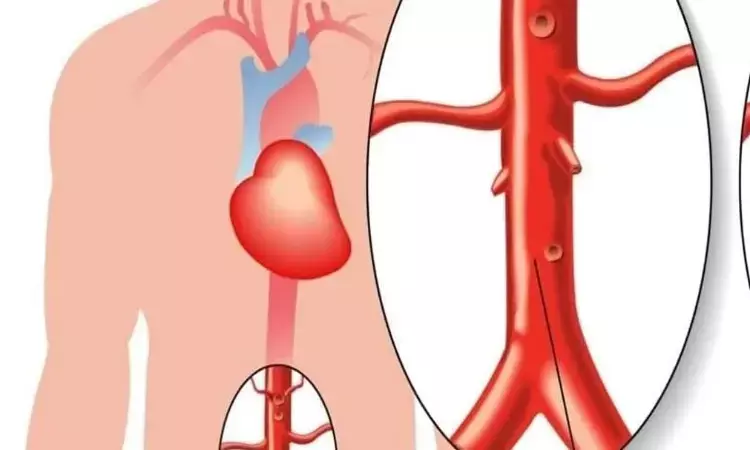- Home
- Medical news & Guidelines
- Anesthesiology
- Cardiology and CTVS
- Critical Care
- Dentistry
- Dermatology
- Diabetes and Endocrinology
- ENT
- Gastroenterology
- Medicine
- Nephrology
- Neurology
- Obstretics-Gynaecology
- Oncology
- Ophthalmology
- Orthopaedics
- Pediatrics-Neonatology
- Psychiatry
- Pulmonology
- Radiology
- Surgery
- Urology
- Laboratory Medicine
- Diet
- Nursing
- Paramedical
- Physiotherapy
- Health news
- Fact Check
- Bone Health Fact Check
- Brain Health Fact Check
- Cancer Related Fact Check
- Child Care Fact Check
- Dental and oral health fact check
- Diabetes and metabolic health fact check
- Diet and Nutrition Fact Check
- Eye and ENT Care Fact Check
- Fitness fact check
- Gut health fact check
- Heart health fact check
- Kidney health fact check
- Medical education fact check
- Men's health fact check
- Respiratory fact check
- Skin and hair care fact check
- Vaccine and Immunization fact check
- Women's health fact check
- AYUSH
- State News
- Andaman and Nicobar Islands
- Andhra Pradesh
- Arunachal Pradesh
- Assam
- Bihar
- Chandigarh
- Chattisgarh
- Dadra and Nagar Haveli
- Daman and Diu
- Delhi
- Goa
- Gujarat
- Haryana
- Himachal Pradesh
- Jammu & Kashmir
- Jharkhand
- Karnataka
- Kerala
- Ladakh
- Lakshadweep
- Madhya Pradesh
- Maharashtra
- Manipur
- Meghalaya
- Mizoram
- Nagaland
- Odisha
- Puducherry
- Punjab
- Rajasthan
- Sikkim
- Tamil Nadu
- Telangana
- Tripura
- Uttar Pradesh
- Uttrakhand
- West Bengal
- Medical Education
- Industry
Vascular calcification protects against progressive abdominal aortic aneurysm expansion, study suggests

Austria: Increased vascular calcification is associated with a significant decrease in aneurysm growth over time, suggests a recent study in the Journal of Vascular Surgery.
The researchers found that increased vascular calcification stabilized the aortic aneurysmal wall and likely provided protection against progressive expansion of abdominal aortic aneurysm (AAA), leading to a significant decrease in aneurysm growth over time. This as a consequence may have implications for rupture risk, morbidity, mortality, and cost.
Currently, the only clinically applied predictor of abdominal aortic aneurysm progression is the maximal aortic diameter. It is known that the rupture risk is associated with aneurysm size; hence, it becomes critical that AAA expansion be accurately monitored. Aneurysmal vessel wall calcification and its implication on AAA expansion are not explored well.
Considering the above, Wolf Eilenberg, University Hospital Vienna, Medical University of Vienna, Vienna, Austria, and colleagues aimed to evaluate the vascular calcification using longitudinal computed tomography angiographies (CTA) of patients with an AAA and its association with AAA growth.
For this purpose, the researchers performed a retrospective study of 102 patients with an AAA with a total of 389 abdominal CTAs at 6-month intervals, treated and followed at the Division of Vascular Surgery, Department of General Surgery, Medical University of Vienna. A review of digitally stored CTAs was done for vascular calcification (volume and score) of the infrarenal aorta and common iliac arteries as well as for morphometric AAA analysis.
Slow versus fast AAA progression was defined as a less than 2 mm or a 2-mm or greater increase in AAA diameter over 6 months in the prognostic setting. A specifically tailored log-linear mixed model was used for examining the association of vascular calcification and the AAA growth rate with longitudinal monitoring data.
The findings of the study were as follows:
· An inverse relation of increased abdominal vessel wall calcification and short-term AAA progression was detected.
· Compared with fast progressing AAA, the median calcification volume of the infrarenal aorta (1225.3 mm³ vs 519.8 mm³), the median total calcification volume (2014.1 mm³ vs 1434.9 mm³), and the median abdominal total customized Agatston calcium (cAC) score (1663.5 vs 718.4) were significantly increased in slow-progressing AAA.
· A log-linear mixed model efficiently predicted AAA expansion based on current diameter and abdominal total cAC score.
To conclude, the researchers observed a protective effect of increased CTA-measured vascular calcification on AAA progression. Fast AAA progression over short-term periods of 6 months may be identified by vascular calcification.
"As a pathological implication, it is indicated that vascular calcification stabilizes the aortic aneurysmal wall and protects against progressive AAA expansion," wrote the authors. "This data may have an impact on patient awareness of disease risk, clinical decision-making, and could lead to an associated decrease in rupture risk, mortality, morbidity, and cost."
Reference:
Klopf J, Fuchs L, Schernthaner R, Domenig CM, Gollackner B, Brostjan C, Neumayer C, Eilenberg W. The prognostic impact of vascular calcification on abdominal aortic aneurysm progression. J Vasc Surg. 2022 Jun;75(6):1926-1934. doi: 10.1016/j.jvs.2021.11.062. Epub 2021 Dec 16. PMID: 34921970.
Dr Kamal Kant Kohli-MBBS, DTCD- a chest specialist with more than 30 years of practice and a flair for writing clinical articles, Dr Kamal Kant Kohli joined Medical Dialogues as a Chief Editor of Medical News. Besides writing articles, as an editor, he proofreads and verifies all the medical content published on Medical Dialogues including those coming from journals, studies,medical conferences,guidelines etc. Email: drkohli@medicaldialogues.in. Contact no. 011-43720751


